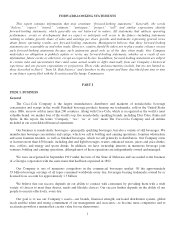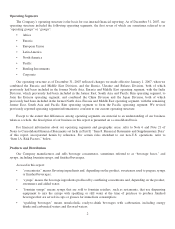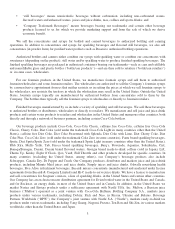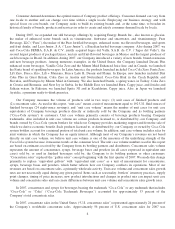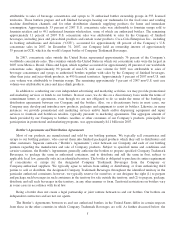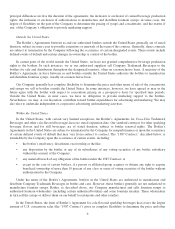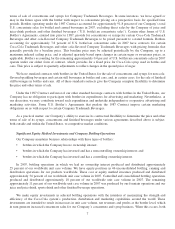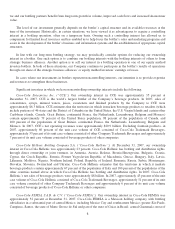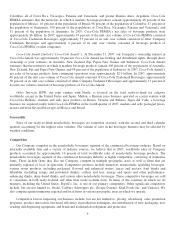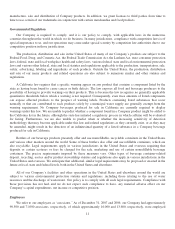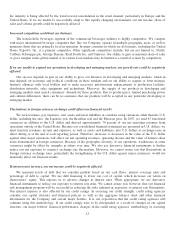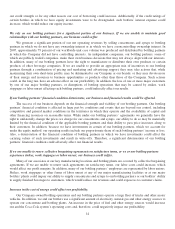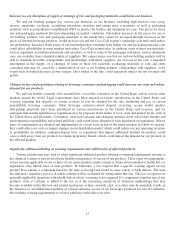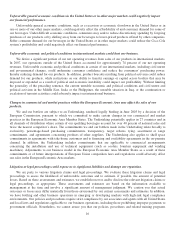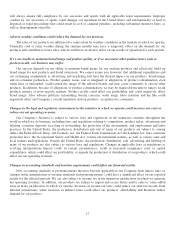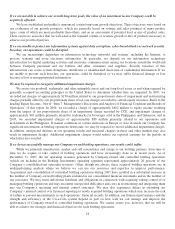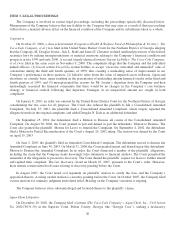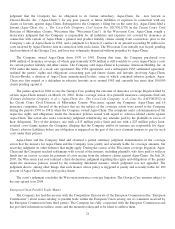Coca Cola 2007 Annual Report Download - page 13
Download and view the complete annual report
Please find page 13 of the 2007 Coca Cola annual report below. You can navigate through the pages in the report by either clicking on the pages listed below, or by using the keyword search tool below to find specific information within the annual report.manufacture, sale and distribution of Company products. In addition, we grant licenses to third parties from time to
time to use certain of our trademarks in conjunction with certain merchandise and food products.
Governmental Regulation
Our Company is required to comply, and it is our policy to comply, with applicable laws in the numerous
countries throughout the world in which we do business. In many jurisdictions, compliance with competition laws is of
special importance to us, and our operations may come under special scrutiny by competition law authorities due to our
competitive position in those jurisdictions.
The production, distribution and sale in the United States of many of our Company’s products are subject to the
Federal Food, Drug, and Cosmetic Act, the Federal Trade Commission Act, the Lanham Act, state consumer protection
laws, federal, state and local workplace health and safety laws, various federal, state and local environmental protection
laws and various other federal, state and local statutes and regulations applicable to the production, transportation, sale,
safety, advertising, labeling and ingredients of such products. Outside the United States, the production, distribution
and sale of our many products and related operations are also subject to numerous similar and other statutes and
regulations.
A California law requires that a specific warning appear on any product that contains a component listed by the
state as having been found to cause cancer or birth defects. The law exposes all food and beverage producers to the
possibility of having to provide warnings on their products. This is because the law recognizes no generally applicable
quantitative thresholds below which a warning is not required. Consequently, even trace amounts of listed components
can expose affected products to the prospect of warning labels. Products containing listed substances that occur
naturally or that are contributed to such products solely by a municipal water supply are generally exempt from the
warning requirement. No Company beverages produced for sale in California are currently required to display
warnings under this law. We are unable to predict whether a component found in a Company product might be added to
the California list in the future, although the state has initiated a regulatory process in which caffeine will be evaluated
for listing. Furthermore, we are also unable to predict when or whether the increasing sensitivity of detection
methodology that may become applicable under this law and related regulations as they currently exist, or as they may
be amended, might result in the detection of an infinitesimal quantity of a listed substance in a Company beverage
produced for sale in California.
Bottlers of our beverage products presently offer and use nonrefillable, recyclable containers in the United States
and various other markets around the world. Some of these bottlers also offer and use refillable containers, which are
also recyclable. Legal requirements apply in various jurisdictions in the United States and overseas requiring that
deposits or certain ecotaxes or fees be charged for the sale, marketing and use of certain nonrefillable beverage
containers. The precise requirements imposed by these measures vary. Other types of beverage container-related
deposit, recycling, ecotax and/or product stewardship statutes and regulations also apply in various jurisdictions in the
United States and overseas. We anticipate that additional, similar legal requirements may be proposed or enacted in the
future at local, state and federal levels, both in the United States and elsewhere.
All of our Company’s facilities and other operations in the United States and elsewhere around the world are
subject to various environmental protection statutes and regulations, including those relating to the use of water
resources and the discharge of wastewater. Our policy is to comply with all such legal requirements. Compliance with
these provisions has not had, and we do not expect such compliance to have, any material adverse effect on our
Company’s capital expenditures, net income or competitive position.
Employees
We refer to our employees as “associates.” As of December 31, 2007 and 2006, our Company had approximately
90,500 and 71,000 associates, respectively, of which approximately 16,000 and 13,600, respectively, were employed
11


